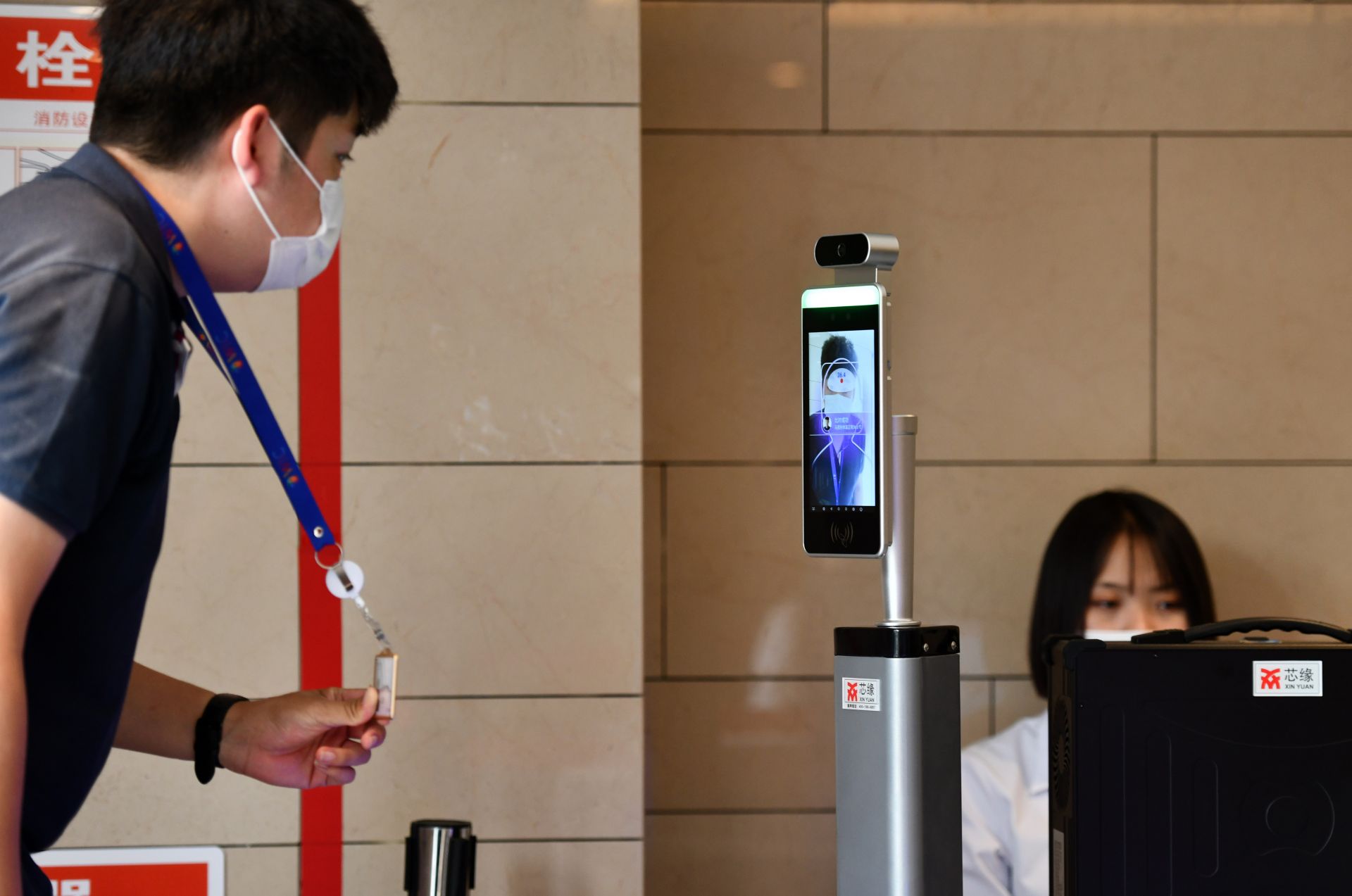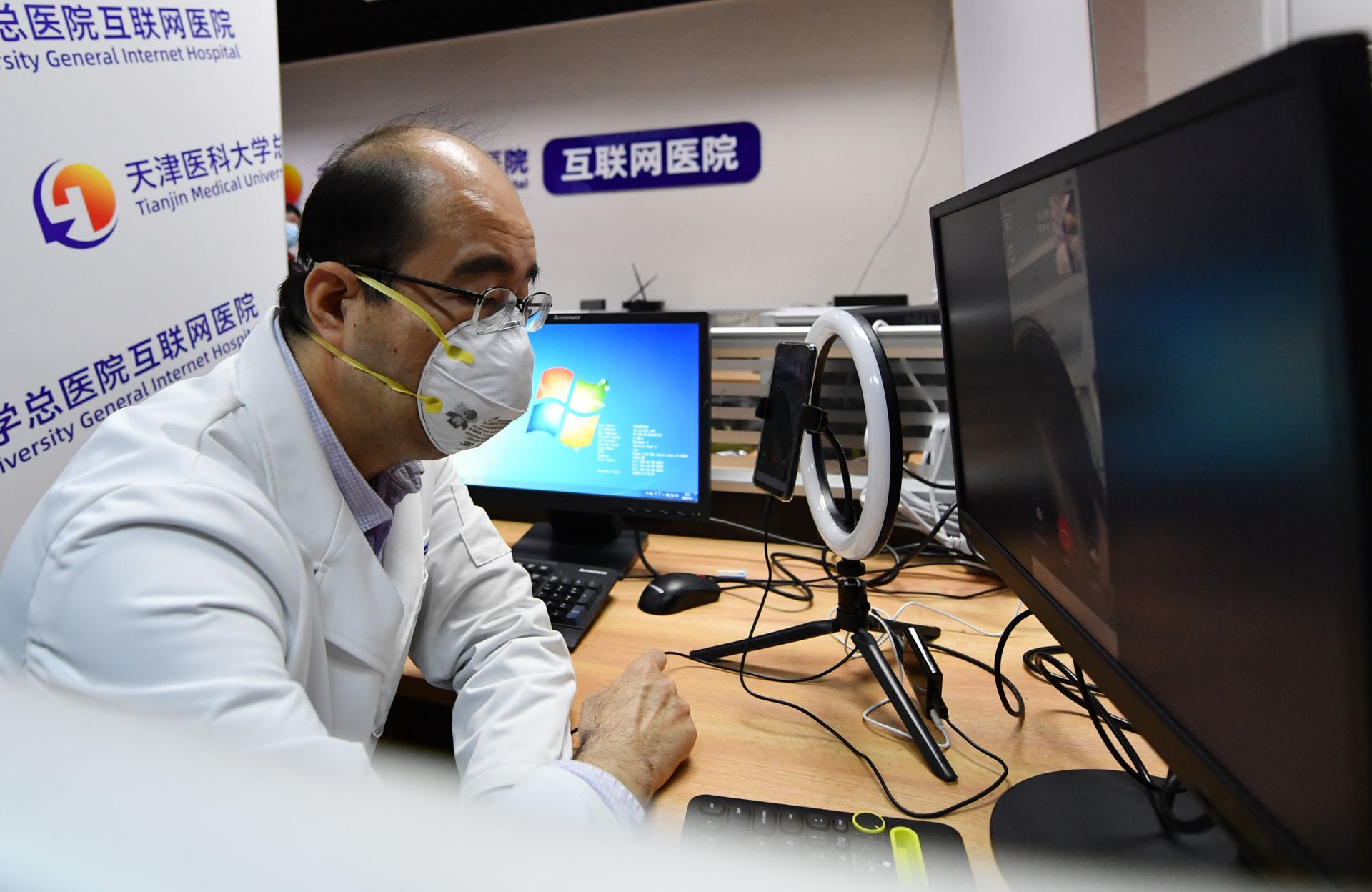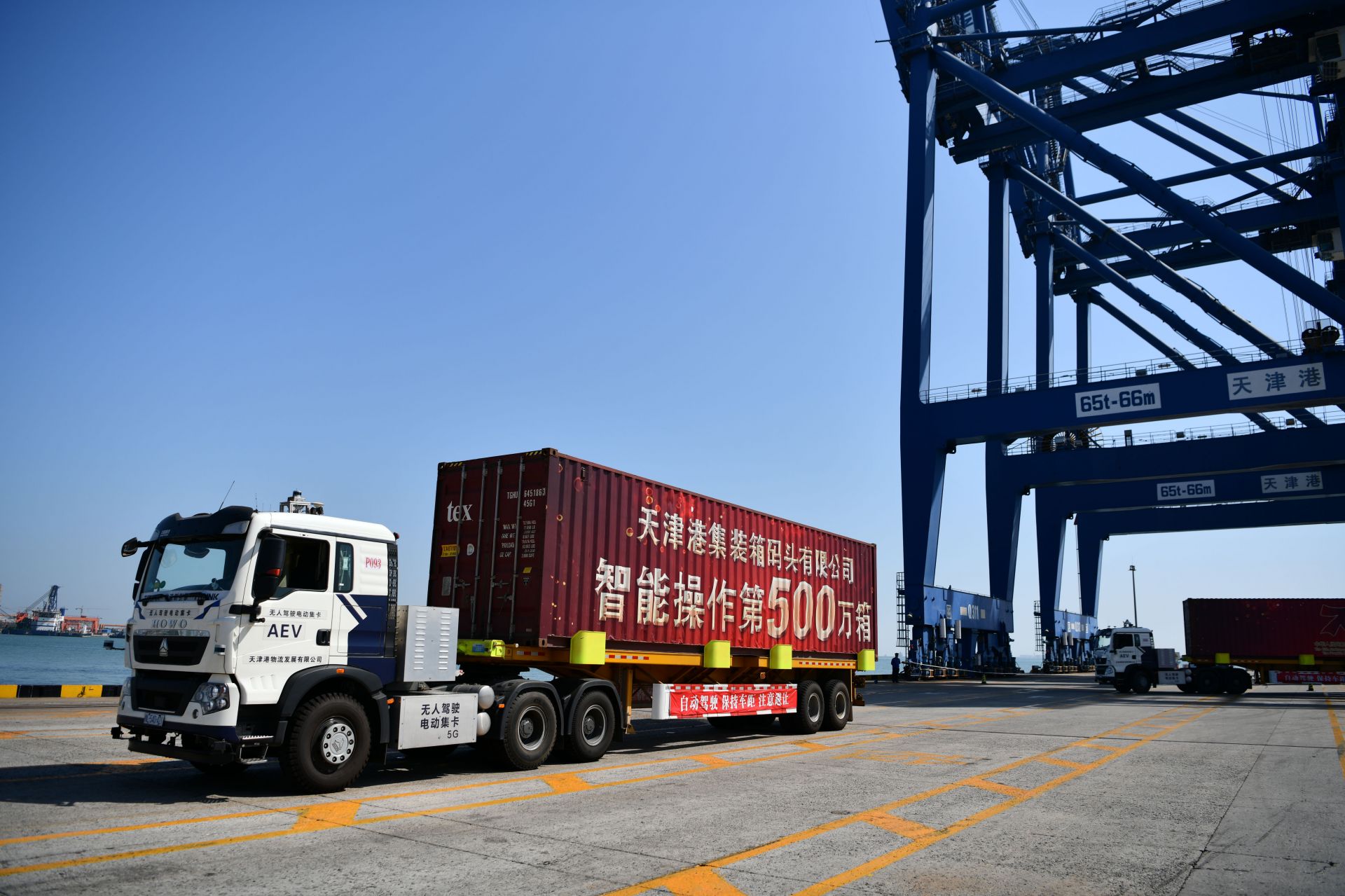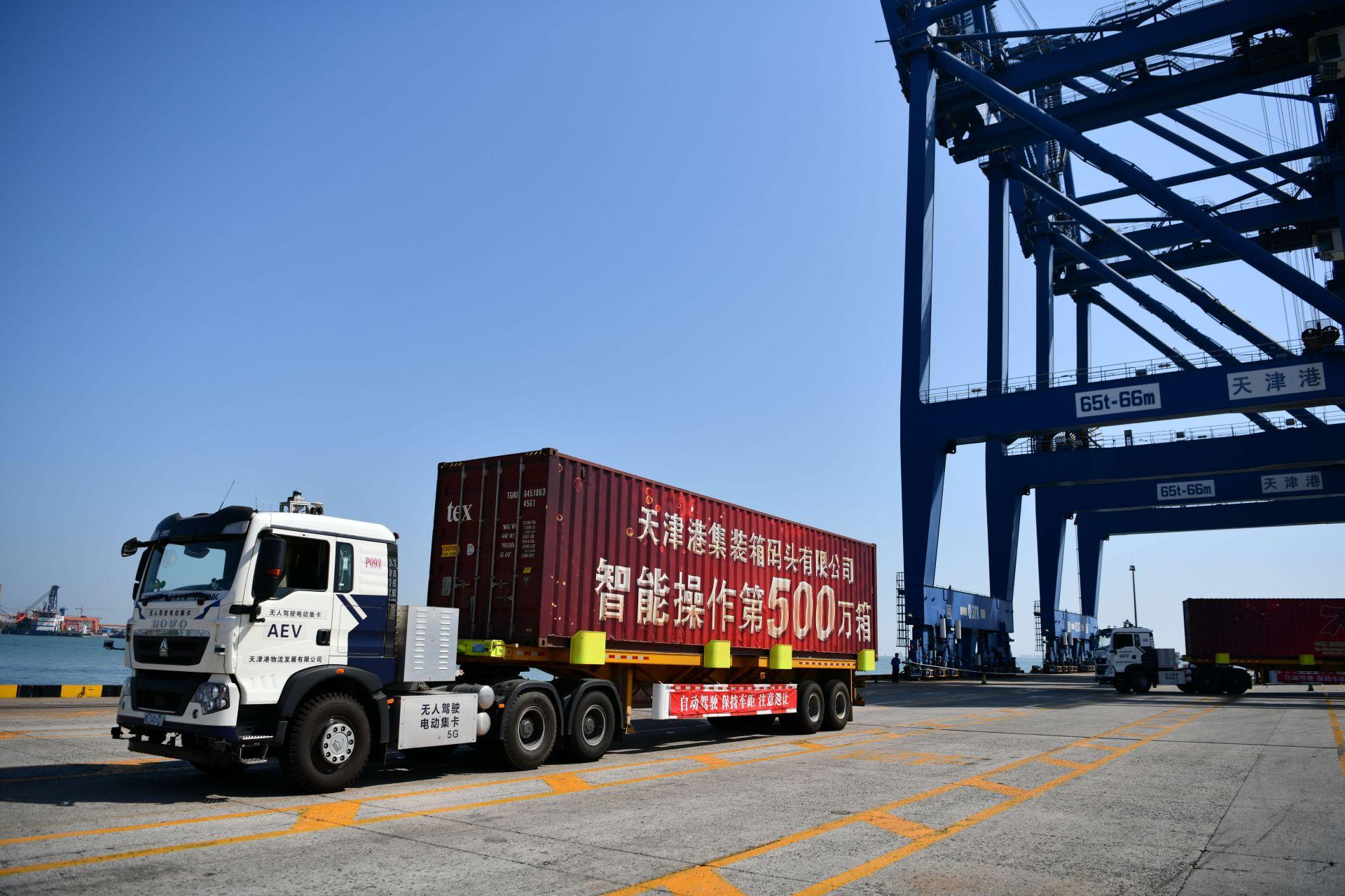- China had 797 AI enterprises at the end of 2019, accounting for 14.8 percent of the world's total and making China second only to the United States in terms of the number of AI firms.
- The application of digitalization, networking and intelligence has made China's economy and society more resilient amid the epidemic.
- As of October 2019, China had registered 440,000 patents in the AI industry, ranking first in the world, according to a report.
by Xinhua writers Li Kun, Song Rui and Fang Ning
TIANJIN, June 25 (Xinhua) -- Without real exhibition halls, the fourth World Intelligence Congress (WIC), a major artificial intelligence (AI) event held in north China's Tianjin Municipality, rode the technology wave to draw 392 million online views in its annual session from Tuesday to Wednesday.

A man wearing a mask uses a facial recognition device before entering the fourth World Intelligence Congress in north China's Tianjin, June 23, 2020. (Xinhua/Li Ran)
To prevent the spread of COVID-19, organizers adopted China's advanced cloud-based virtual solutions for online viewers to take part in or watch a series of business activities and competitions, such as the world intelligence driving challenge, which drew 145 teams from countries including the United States, Japan and Germany.
A total of 131 domestic investment projects with total investment of 80.9 billion yuan (11.4 billion U.S. dollars) and 17 foreign investment projects with total investment of 1.6 billion dollars were signed online.
Jin Xiangjun, vice mayor of Tianjin, said at the closing ceremony Wednesday that 40 websites and online platforms broadcast this year's WIC, drawing viewers from the United States, Britain, Germany, Australia, Japan, the Republic of Korea, and Singapore.
CHINA'S SOLUTION
Entering a booth on the website of WIC, one was greeted by a virtual human-like robot who introduced exhibitors' products with pictures and video clips.
A report released at the WIC by the Chinese Institute of New Generation Artificial Intelligence Development Strategies said China had 797 AI enterprises at the end of 2019, accounting for 14.8 percent of the world's total and making China second only to the United States in terms of the number of AI firms.

A medical worker from Tianjin Medical University General Hospital conducts online inquiry via mobile phone in Tianjin, north China, March 3, 2020. (Xinhua/Li Ran)
"The spread of COVID-19 has grounded trips. WIC provided global AI industry players a platform for exchanges at this time," said Zhou Hongyi, founder of Chinese internet security firm Qihoo 360.
Experts and entrepreneurs at the congress said that the pandemic still spreading around the world has put off many international exhibitions and congresses, but helped the world embrace a faster development of intelligent technology.
China has come up with new solutions for online communication demands worldwide. The 127th China Import and Export Fair, the country's oldest and largest trade expo, was held online for the first time and concluded Wednesday, drawing some 26,000 domestic and foreign companies which exhibited 1.8 million products.
Tencent has been one of the Chinese tech companies empowering the trade fair and the online WIC.
Ren Yuxin, chief operating officer of Tencent, said that the application of digitalization, networking and intelligence has made China's economy and society more resilient amid the epidemic.
Tencent and the United Nations in March announced they will form a global partnership to hold thousands of conversations online for the 75th anniversary of the United Nations.
Liu Qingfeng, chairman of Chinese tech firm iFlytek, said at the WIC that the company's telephone robots have helped with the survey of millions of people in China on COVID-19. The robots have been introduced in the Republic of Korea to help undertake a survey on public health conditions.
First adopted during the anti-epidemic fight in the city of Wuhan, the previous epicenter of the outbreak in China, the robots finished asking questions to 1 million people in the city in six hours.
As of October 2019, China had registered 440,000 patents in the AI industry, ranking first in the world, according to a report by China Industrial Control Systems Cyber Emergency Response Team.
"Experiencing the COVID-19 epidemic, there is no longer a pure 'traditional industry' in China. Every industry has more or less started with the digital process," Ren said.

The driverless electric container truck loaded with containers heads for the dock at the Tianjin Port in north China's Tianjin, Sept. 26, 2019. (Xinhua/Li Ran)
SHARED FUTURE
During the WIC, China launched the last satellite of the BeiDou Navigation Satellite System (BDS). With its integration with new technologies, such as big data and AI, the BDS system is used by more than half of the countries in the world, adhering to the principle of "developed by China, dedicated to the world."
COVID-19 knows no borders, and AI technological innovation should also go beyond national boundaries to provide public goods for the fight against COVID-19 and help build a community of health for all, said Wan Gang, chairman of the China Association for Science and Technology, in his speech to the WIC.
Chinese internet medical platform WeDoctor launched its global anti-epidemic online service on March 14 in five languages, serving 3.49 million users in 220 countries and regions. A total of 11,225 Chinese medical experts have rendered free online services, offering over 14 million consultations on the platform around the world so far.
"Internet medicine has stepped into the era of digital health, when all medical resources should be used to build up a community of digital health," said Liao Jieyuan, chairman of WeDoctor.
(Video reporters: Wang Hui, Li Kun and Yang Zichun; Video editor: Jia Xiaotong)




 A single purchase
A single purchase









